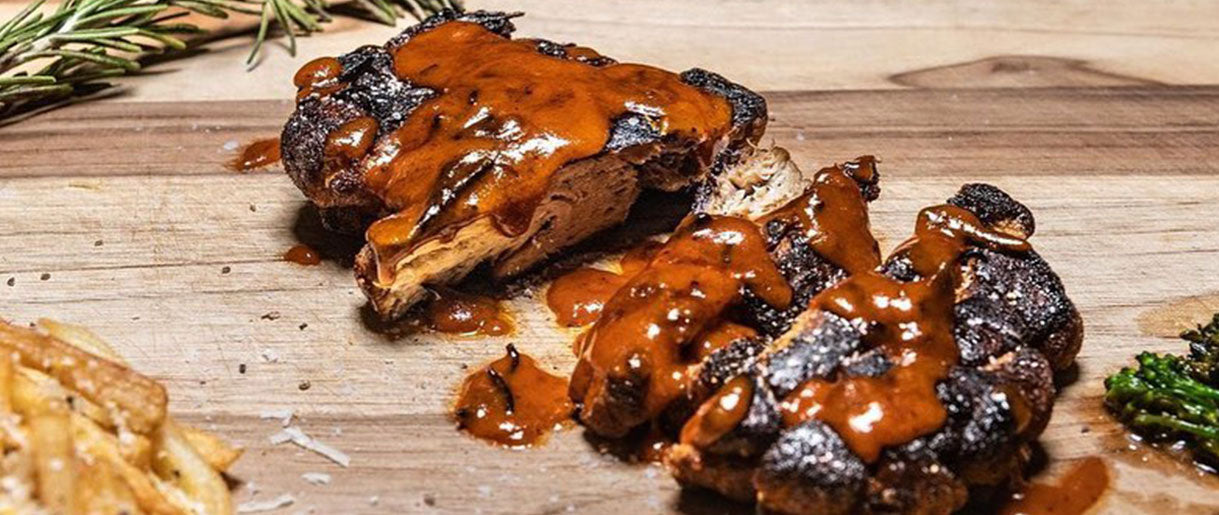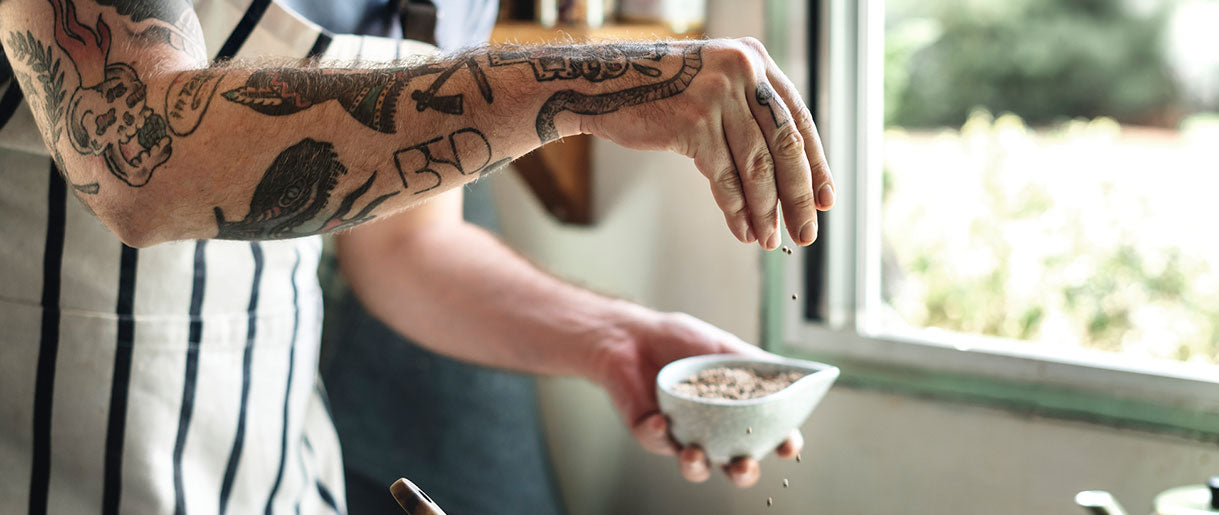Mycelium, the root-like part of fungi, including medicinal mushrooms, is generally considered safe for consumption. This is because it's rich in beneficial compounds such as beta-glucans, terpenes, and antioxidants, associated with various health benefits like boosting immunity, supporting brain health, and promoting overall well-being.
However, like any supplement, potential side effects, primarily digestive discomfort, could occur, especially in individuals with mushroom allergies or sensitivities. Therefore, a lower dose is recommended to see how your body responds, gradually increasing as tolerated. Also, consult a healthcare provider before adding a new supplement to your regimen, especially if you're pregnant, breastfeeding, or have underlying health conditions.
If you are considering adding mycelium to your diet, you may want to know the best types. Moreover, you may want to understand the health benefits of mushroom mycelium. Join us as we explore the fascinating world of mushroom mycelium.
Understanding Mycelium: Appearance and Its Roles

What is Mycelium?
The fascinating world of fungi is deeply rooted in a complex web-like structure known as mycelium. Mycelium is the vegetative part of a fungus, consisting of a network of fine white filaments, often likened to the roots of a plant.
Mycelium consists of hyphae and individual fungal threads forming a dense and intricate network. This network serves as the foundation for mushroom growth, including the development of the fruiting bodies, the part of the mushroom we typically see and eat.
Role of Mycelium in Mushroom Growth and Reproduction
Mushroom mycelium plays a vital role in the mushroom's life cycle and is integral to its growth and reproduction. The mycelium represents the primary living and growing part of the fungus. It's responsible for absorbing nutrients from the surrounding environment, helping the mushroom to grow and eventually form the fruiting body.
Understanding the Fruiting Body and the Life Cycle of Mushrooms
The fruiting body, often what we think of when we imagine a mushroom, is the fungi's reproductive organ. Here, the spores—the "seeds" of the mushrooms—are produced and released into the surrounding ecosystem. Once these spores find a suitable environment, they can grow into new mycelium, continuing the mushroom's life cycle.
The Mycelium and Its Role in the Ecosystem
The role of the mycelium supports more than just the mushroom's life cycle. In nature, mycelium serves as an essential component of the ecosystem. It decomposes organic matter, turning it into nutrients that plants can absorb. Furthermore, mycelium forms symbiotic relationships with trees and plants, helping them to absorb water and essential nutrients.
Moreover, certain types of mycelia can break down industrial wastes that would typically be undegradable, including plastics, unrefined oil, hydrocarbons, and nuclear waste. Using this power for environmental cleanup is known as mycoremediation.
The process of mycoremediation can assist with environmental cleanup in the following ways:
- Converts petroleum wastes and other heavy metals from the soil into less toxic compounds
- Removes and destroys contaminants from water sources, such as toxic wildfire ash and bacteria like E. coli
- Mycelium is an environmentally friendly yeast that reduces invasive plant species' competition, which helps with faster reforestation efforts. More forests clear the environment of carbon dioxide (greenhouse gas emissions), improving our breathing air
Is Mycelium Safe to Eat?

As the interest in medicinal mushrooms and their potential health benefits grows, so do questions about their safety. For example, is mycelium safe to consume? Here, we address this question and explore the existing research on the topic.
Can You Eat Mycelium?
The mycelium and the fruiting body of medicinal mushrooms have been used for centuries for human consumption.
Today, many supplements contain mushroom mycelium, promoting many health benefits. However, as with any supplement, it's essential to know the source of your mycelium and ensure it is produced and processed safely for human consumption.
Safety Concerns Around Consuming Mycelium
One of the primary concerns around consuming mycelium is the potential for contamination. Like all agricultural products, mushrooms and their mycelium can be exposed to harmful substances in their growing environment, such as heavy metals or pesticides. Therefore, it's crucial to source mycelium products from reputable suppliers that rigorously test for these contaminants to ensure the product's safety.
Another concern is potential allergic reactions. While uncommon, some individuals may have an allergic reaction to mushrooms or mushroom-derived products. For these reasons, starting with a small dose is advisable to gauge your body's response.
Scientific Studies on the Safety of Medicinal Mushroom Mycelium
Several scientific studies have been conducted to assess the safety of consuming medicinal mushroom mycelium. Generally, these studies have found mycelium safe for consumption, even in high doses.
For instance, a study published in the Journal of Ethnopharmacology found that Reishi mushroom mycelium did not cause any adverse effects in participants, even when consumed daily in high doses over a long period.
However, more research is needed, particularly long-term studies on human subjects. Most existing studies have been conducted on animals or have focused on short-term use in humans.
Possible Side Effects and Contraindications
While most people can safely consume mycelium, some may experience side effects. These are typically mild and may include digestive upset, diarrhea, or skin rash. These symptoms often resolve on their own once consumption is stopped.
Certain individuals should exercise caution when considering adding mycelium to their diet. Pregnant and breastfeeding women, for example, should always consult with a healthcare provider before taking new supplements. Similarly, individuals with autoimmune disorders or immunosuppressive drugs should be cautious, as medicinal mushrooms can modulate the immune system.
Interesting Read: Learn about Lion's mane drug interactions.
Benefits of Consuming Medicinal Mushrooms' Mycelium

Mushroom mycelium grown under controlled conditions carries numerous benefits vital to the user's health. Below, we will look at what researchers have discovered about using pure mycelium:
Reishi Mushroom
Known as the "mushroom of immortality," Reishi mushroom mycelium is revered for its immune-modulating properties(1). The health benefits of Reishi mushrooms can help support a healthy immune response and promote overall wellness.
In addition to boosting your natural immune systems, Reishi mycelium is also a potential anti-cancer agent and a stress reliever. Additionally, eating mycelium from Reishi can provide therapeutic effects on insulin resistance, lower prostate cancer risk, and help with several metabolic syndrome-related conditions.
Lion's Mane Mushroom
Lion's mane mycelium has grown in popularity for its ability to help a restless or foggy mind focus and become more clear-headed. In addition, the neuro-health benefits of Erinacines, isolated from Lion's mane mycelia, have been the subject of numerous research.
Preclinical studies(2) have suggested that if mycelia enriched with erinacines are added to daily meals, Parkinson's disease, Alzheimer's disease, ischemic stroke, and depression may improve.Moreover, Lion's mane may boost memory, supporting cognitive function and mental clarity.
Turkey Tail Mushroom
Turkey Tail mushroom mycelium is rich in polysaccharide-K (PSK). The PSK is a bioactive compound known to support immune health.
Cordyceps Mushroom
Cordyceps mushroom mycelium is often used for its potential to enhance energy and stamina. However, it's also recognized for its immune-supporting properties.
Interesting Read: See how cordyceps boosts energy and stamina.
Chaga Mushroom Mycelium
Mycelium from Chaga mushrooms helps the body's natural defenses remain strong and supports a healthy immune system and stress response. It may be an alternative treatment for arthritis and high blood pressure because it is thought to possess potent antioxidant and anti-inflammatory properties. Chaga(3) also helps lower blood sugar and even slow the growth of cancerous cells.
How to Safely Incorporate Mycelium into Your Diet

Incorporating mycelium into your diet can provide a host of potential health benefits. However, it's essential to do so safely and responsibly. Here are some recommendations on consuming mycelium, the recommended dosages, and tips for buying high-quality mycelium products.
Suggested Methods of Consumption
Mycelium is most commonly consumed as a dietary supplement—some manufacturers separate mushroom mycelium from the fruiting bodies to create ready-to-use products. These are often found in capsule or powder form, which can be taken directly or mixed into food or drinks.
For example, some people enjoy adding mycelium powder to their morning smoothie or coffee, while others prefer to take capsules for convenience.
Another popular method of consuming mycelium fungus is through mycelium-infused teas or coffees, providing an easy and enjoyable way to incorporate mycelium into your daily routine.
Mushroom Mycelium As A Meat Alternative
Mushroom mycelium can be an excellent and tasty plant-based alternative to meat. It can be purchased ground or grown and shaped into various meat-like textures.
Although it has a slightly different flavor and considerably more advantages, meat from mycelium has the same fibrous and tender consistency as meat from animals.
Mycelium meat is a complete and nutrient-dense protein because it contains all nine essential amino acids. Additionally, it has an adequate amount of fiber, zinc, iron, and B vitamins.
In addition, compared to raising cattle, growing fungi-based meat requires up to 99% less energy, land, and water.
Recommended Dosages
Dosages can vary widely depending on the type of mushroom mycelium and the specific product. In general, daily doses can range from 500 mg to 3,000 mg. Start with a lower dose to see how your body responds, gradually increasing as tolerated.
Follow the manufacturer's instructions on the product packaging. Moreover, consult a healthcare provider or a knowledgeable professional to determine an appropriate dosage for your needs.
Tips on Buying High-Quality Mycelium Products
Quality matters when purchasing mycelium products. Here are some tips to help you choose a high-quality product:
Source
Choose products from reputable companies that prioritize quality and safety. In addition, they should be able to provide information about where and how their mushrooms are grown.
Testing
High-quality manufacturers will test their products for contaminants such as heavy metals, pesticides, and other harmful substances. In addition, look for products that have been independently tested and verified for purity and potency.
Full-Spectrum
Full-spectrum mycelium products contain various beneficial compounds, including beta-glucans, triterpenes, and other active constituents. Therefore, look for products labeled as "full-spectrum."
Transparency
Companies should be transparent about their extraction methods and the specific species of mushrooms used in their products.
Interesting Read: Learn what to look for when buying Lion's mane.
Can You Grow Mushroom Mycelium At Home?

As noted earlier, mushroom mycelium grown under controlled conditions is the best to eat. Therefore, you may want to vet your supplier when adding mycelium to your foods and nutrition.
However, industrial mycelium is not always safe, and the information on the packaging may be lacking. Therefore, you may want to grab your mushroom spores and other materials to grow your mycelium at home.
Growing mushroom mycelium requires a substrate to thrive on. You can utilize the nourishing properties of organic brown rice as the substrate for your organic mushroom mycelium. As you grow mycelium, it consumes and digests the rice, absorbing its vital nutrients.
The mycelium ferments the substrate transforming it into a dense and inseparable matrix of mycelium called "myceliated" fermented rice. This incredible process showcases the remarkable power of nature's transformative abilities. Moreover, the fermented substrate does have health benefits and is safe for human consumption.
When you grow mushroom mycelium, you can choose from various substrates, including grain substrate. However, when you get your spores, there are several reasons you may want to use brown rice as your substrate:
- A majority of people tolerate brown rice
- It is exceptionally nutritious, making it an excellent nutrition source for mycelium.
Read More: Learn how to grow Lion's mane mushrooms.
FAQs About "Is Mycelium Safe To Eat?"
Can Mycelium Be Toxic?
Mycelium from edible and medicinal mushrooms is non-toxic, safe to eat, and can be added to human nutrition. However, as expected, mycelium from toxic mushrooms will also be harmful.
For this reason, before consuming any mushroom mycelium, ensure it is from an edible mushroom, like truffles, Lion's mane, Chaga, or Reishi. Alternatively, you can get mycelium-based supplements, including alcohol extracts, tinctures, and powders.
What Does Mycelium Do To The Brain?
Erinacines in Lion's mane mycelium are known to stimulate the growth of neurons in the brain. The mycelium, therefore, supports cognition and focus and is beneficial for neurodegenerative diseases like Alzheimer's and Parkinson's.
Moreover, mycelium from Reishi mushroom can boost the production of happy hormones—serotonin and dopamine. Therefore, Reishi mushroom mycelium can be a natural medicine for depression, anxiety, and stress.
What Does Mycelium Do To The Body?
Scientific evidence suggests that mushroom mycelium has health-supporting benefits. It increases immunity by activating and regulating cells of the immune system. It can also combat inflammation and potentially act as an anti-cancer agent.
Mycelium can also facilitate weight loss by keeping you full and improving your metabolism. In addition, Chaga mushroom mycelium may enhance your hair health—research has shown(4) that Chaga may be as effective as a hair loss medication known as minoxidil.
Key Takeaways
Mycelium from medicinal mushrooms like Reishi, Chaga, and Lion's mane, is 100% safe to consume. This mycelium can improve brain function and immune response, relieve stress, potentially fight cancer, and boost overall human health.
There are numerous ways to enjoy mushroom mycelium. However, most people use supplements, including alcohol extracts, powders, alcohol tinctures, and even capsules. But you can cook mycelium, leveraging it as one of your meat substitutes if you are vegan.
However, remember that edible mushrooms are the only mycelium safe for consumption. Mycelium from toxic mushrooms will also be harmful and unhealthy.
Have you used mushroom mycelium before? From which mushroom did you get your mycelium? Which benefit or features of the mycelium did you enjoy the most? Let us know in the comments.
References
- Ganoderma lucidum mycelium and spore extracts as natural adjuvants for immunotherapy, (1)https://pubmed.ncbi.nlm.nih.gov/16398597/
- Neurohealth Properties of Hericium erinaceus Mycelia Enriched with Erinacines, (3)https://www.ncbi.nlm.nih.gov/pmc/articles/PMC5987239/
- Antitumor and Hypoglycemic Activities of Polysaccharides from the Sclerotia and Mycelia of Inonotus obliquus (Pers.: Fr.) Pil. (Aphyllophoromycetideae), (3)https://www.dl.begellhouse.com/journals/708ae68d64b17c52,541026cc01c467e3,3b27577f0e4e1ae1.html
- Lanostane-type triterpenes from the sclerotium of Inonotus obliquus (Chaga mushrooms) as proproliferative agents on human follicle dermal papilla cells, (4)https://pubmed.ncbi.nlm.nih.gov/30706371/









Let Us Know Your Comments